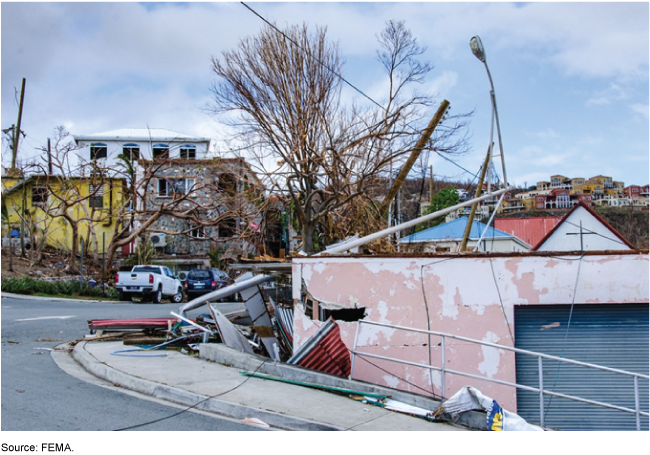Disaster Block Grants: Factors to Consider in Authorizing a Permanent Program
Fast Facts
Because disaster recovery block grants aren't part of a permanent program, grant requirements have to be customized for each disaster. This is time-consuming for the agency and for grantees—leading to delays in receipt and use of the funds.
We testified that, when deciding whether and how to permanently authorize the program, Congress could:
- Clarify how the program fits into the federal disaster framework
- Clarify the program's purpose and balance flexibilities with other measures to address the purpose
- Consider capacity at the federal, state, local, tribal, and territorial levels to deliver funds faster and protect the program from fraud

Highlights
What GAO Found
In March 2019, GAO reported that because the Community Development Block Grant Disaster Recovery (CDBG-DR) program lacks permanent authority and regulations—unlike other disaster assistance programs—appropriations require the Department of Housing and Urban Development (HUD) to customize grant requirements for each disaster in Federal Register notices—a time-consuming process. GAO identified challenges associated with the lack of permanent statutory authority, including delays in disbursal of funds and the need for grantees to manage multiple grants with different rules. For example, GAO found it took HUD 5 months after the first appropriation for the 2017 hurricanes (Hurricanes Harvey, Irma, and Maria) for HUD to issue the first Federal Register notice establishing the grant requirements. Officials from one of the 2017 CDBG-DR grantees told GAO of challenges managing multiple CDBG-DR grants it received over the years because each grant had different rules. HUD officials noted then that permanently authorizing CDBG-DR would allow HUD to issue permanent regulations for disaster recovery.
GAO identified factors to consider when weighing whether and how to permanently authorize a program for unmet disaster assistance needs. These factors, which are based on GAO's body of work on emergency management and past observations of broader government initiatives, include the following:
- Clarify how the program would fit into the broader federal disaster framework. GAO has emphasized the importance of articulating a program's relationship to other programs and of aligning the program within organizations with compatible missions and goals. This is particularly important with disaster programs, given the approximately 30 agencies involved in disaster recovery.
- Clarify the purpose and design the program to address it. Greater clarity about the purpose of CDBG-DR could help resolve implementation issues GAO has previously identified, such as how much time grantees should have to spend funds and the proportion of funds that should be distributed to renters.
- Consider the necessary capacity and support infrastructure to implement the program. GAO's prior work found that state, local, territorial, and tribal grantees and federal agencies faced capacity challenges in administering and overseeing federal grant funds, including CDBG-DR. Capacity challenges for grantees may contribute to fraud risks and slow expenditure of funds.
Why GAO Did This Study
Legislation proposed over the years would permanently authorize CDBG-DR or a similar program, but no proposal has been enacted. Since 1993, Congress has provided over $90 billion in supplemental appropriations through HUD's CDBG program to help communities recover from disasters. Just since 2001, HUD has issued over 100 Federal Register notices linked to these funds. Communities use these funds to address unmet needs for housing, infrastructure, and economic revitalization. HUD is one of approximately 30 federal agencies tasked with disaster recovery.
This testimony discusses (1) challenges associated with the lack of permanent statutory authority for CDBG-DR and (2) factors to consider when weighing whether and how to permanently authorize CDBG-DR or a similar program. It is based primarily on GAO's March 2019 and May 2021 reports on CDBG-DR (GAO-19-232 and GAO-21-177) and GAO reports issued between February 2004 and June 2019 that identified factors to consider in making critical federal policy decisions. For those reports, GAO reviewed documentation on CDBG-DR and its observations of efforts to reorganize or streamline government, among other things.
Recommendations
In March 2019, GAO recommended that Congress consider permanently authorizing a disaster assistance program that responds to unmet needs in a timely manner. GAO continues to believe that establishing such authority would provide a more consistent framework for administering funds going forward.
